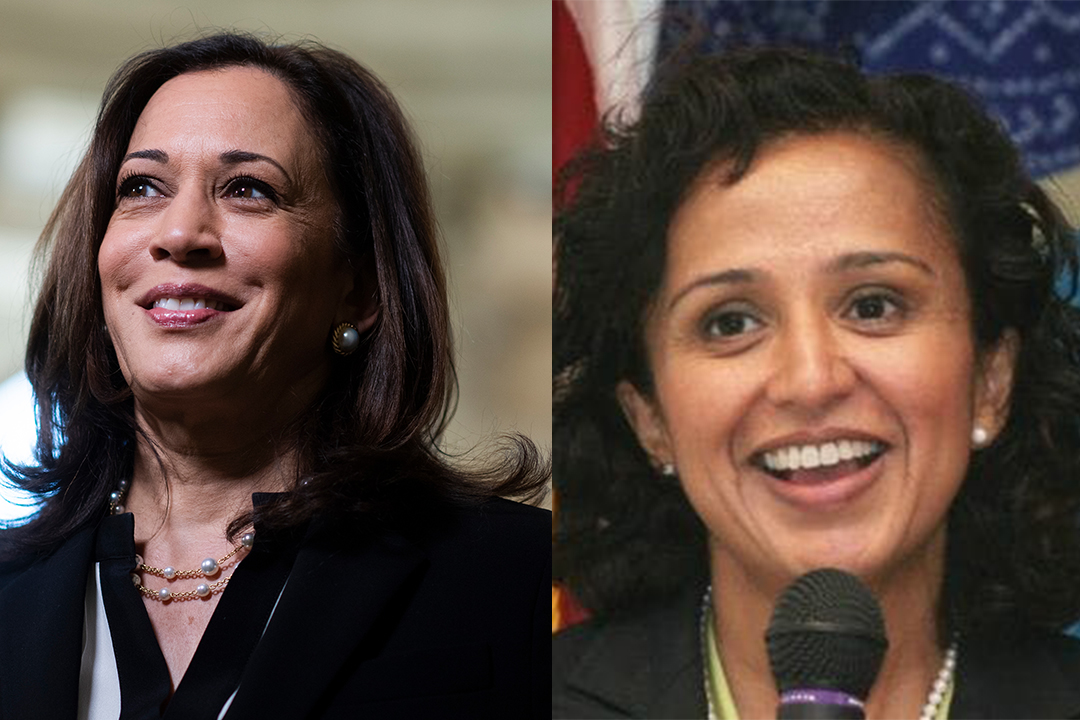
“When Kamala Harris became Vice President, America took a glorious step into the future,” writes speaker Nancy Pelosi
Vice President Kamala Harris and community activist Manjusha Kulkarni, co-founder of the Web portal Stop AAPI Hate, are the only two Indian Americans in Time Magazine’s list of “100 Most Influential People” this year.
While Kulkarni is listed among Icons, Harris figures among Leaders with Indian Prime Minister Narendra Modi and West Bengal Chief Minister Mamata Banerjee.
Pune-based Adar Poonawalla, chief executive officer of the Serum Institute of India, which has manufactured more than 100 million doses of the Oxford/Astra Zeneca Covid-19 vaccine each month since April is the third Indian on the list. He figures among Pioneers.
Read: Indian American Hasan Minhaj among Time’s 100 most influential people of 2019 (April 17, 2019)
“When Kamala Harris became Vice President, America took a glorious step into the future,” wrote House Speaker Nancy Pelosi in her profile of the daughter of an Indian mother and a Jamaican father. “Children in America were awakened to new possibilities. People around the world saw America in a new light.”
“There was joy in the air, not just because Kamala Harris was the first woman and first Black person and first Asian person to become Vice President, but because the country saw what Joe Biden knew: that Kamala Harris was the best.”
Pelosi, who has known Harris “for a long time,” wrote, “We are Californians with a common motivation: family.” Harris’ “mother raised her two daughters as she worked as a scientist to cure breast cancer,” she wrote.
“Her mother’s self-determination drives the Vice President’s work—whether that is providing tangible relief to families, lifting up women in the workforce or defending the right to vote.”
Harris “wants everyone to have the opportunity to determine their future,” wrote Pelosi.
In her profile of Kulkarni and Stop AAPI Hate co-founders Russell Jeung and Cynthia Choi, poet and author Cathy Park Hong noted, “In a turbulent year, as the US has seen a surge in racist, anti-Asian attacks—from terrifying assaults on senior citizens to the tragic mass shooting in Atlanta violence than Stop AAPI Hate.”
“Since its start, the organization has logged more than 9,000 anti-Asian acts of hate, harassment, discrimination and assault across the country.” she wrote.
Jeung, Choi and Kulkarni, Hong wrote, “created a place where Asian Americans and Pacific Islanders could file firsthand accounts of racism they had experienced—the types of incidents that have long haunted our communities but gone unreported by government agencies and the media and unnoticed by others.”
“Stop AAPI Hate has become not only an invaluable resource for the public to understand the realities of anti-Asian racism, but also a major platform for finding community-based solutions to combat hate.”
“And its leaders have locked arms with other BIPOC organizations to find restorative justice measures so that civil rights—for all vulnerable groups—receive the protection they deserve.”
In his profile of Poonawala, Time producer Abhishyant Kidangoor noted, “From the beginning of the pandemic, Adar Poonawalla sought to meet the moment.”
“His company, the Serum Institute of India, was already the world’s largest vaccine maker when he promised 1.1 billion doses of Covid-19 vaccines for the developing world by the end of 2021.
Read: Kamala Harris, Manjusha Kulkarni Among 100 Most Influential People (September 17, 2021)
“That assurance was the backbone of the plan for global vaccine access mounted by a coalition of institutions, including the World Health Organization,” Kidangoor wrote. Poonawalla told Kidangoor in March he didn’t want to “have regrets when history judges my actions.”
“Whether Poonawalla can right the ship this time will determine which side of history he falls on—and, more importantly, how quickly the world emerges from the pandemic,” he added.



